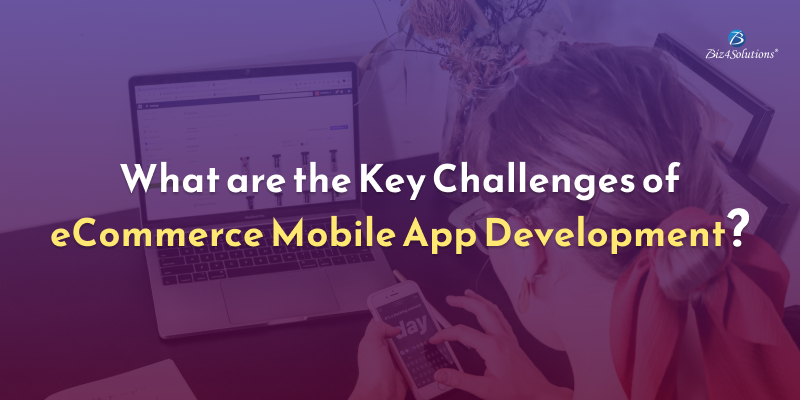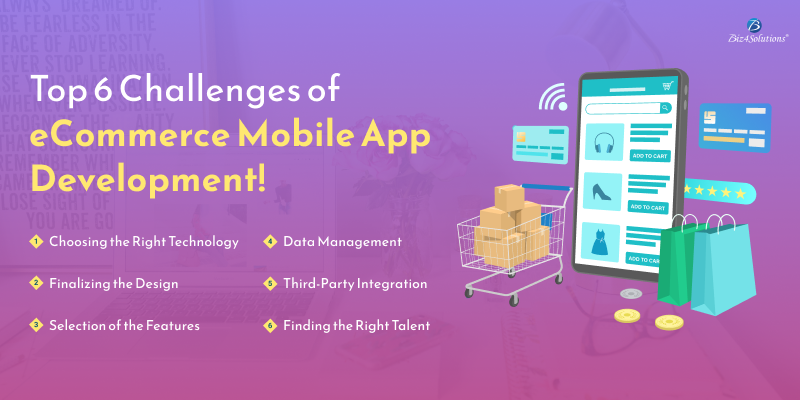
The fast evolution of wireless technologies has given way to convenient and modern ways of conducting business. Over the years, eCommerce apps have found a stronghold in the market. They can be tailored by the app owners according to the requirements. The user data accumulated using mobile apps has helped companies to improve their marketing and sales operations. Mobile apps have emerged as an operational solution that enables workers in an array of processes from scheduling tasks to tracking progress. These apps are known to enhance the profitability of the eCommerce business. Mobility and ease of use are a few of the key reasons boosting the adoption of these mobile apps for eCommerce websites. The app owners can integrate multiple features in the apps according to their requirements. They use these features to increase brand loyalty, market their products, and engage with customers. There can be a range of features such as cameras, push notifications, and digital payment.
While all this sounds amazing, there are certain challenges faced by app developers in developing mobile apps for eCommerce businesses. Every step in application development requires a lot of analysis and research. Here are some of the challenges you may deal with when developing eCommerce apps.

1. Choosing the Right Technology
How we interact with an app or a system largely depends on the technology behind it. With new technologies coming into the picture, we have the option to think about using them. Unlike the situation a decade back where everyone jumped on to the latest technology, we have many eCommerce app development technologies which can confuse you. Many things including the target audience and the type of app are taken into consideration to decide the technology for the application. The thought behind the technology selection has to be futuristic, keeping the scalability and future goals under consideration. You may need an eCommerce mobile app for the PAN India approach or creating a global community.
The companies have the choice to connect with an eCommerce application development company to get in touch with experienced professionals who can help them decide on the technology and develop the app.
2. Finalizing the Design
The design of the application holds the key to the user experience. Besides the user interface, we also need to focus on the tech stack used for creating this interface. Your team may create interesting and creative designs but all the efforts may go in vain if the target audience does not resonate with them. Designing the front end is very challenging where the designing team has to get into hit-and-trial methods to get the best design that fits all the features. Many times the designs get approved by the client but when it comes to the actual screen, many changes are suggested by the client.
How should one proceed with the designing of eCommerce apps? The eCommerce app developer should ideally have two to three different prototypes of the application. It is better to give choice to the client. The second thing can be running user feedback sessions where you get feedback on the design before implementing it for use.
3. Selection of the Features
The features of the app are all about the offerings. The benefits of the app can be leveraged by the consumers only after being availed by them in the correct process. Any complex or irrelevant feature can confuse the consumers and fail the purpose of the application. Besides these features, we also need to add features that allow mobile applications to communicate with customers. For instance, the eCommerce mobile application may have a fitness tracking feature. Going ahead with the trend, you may want to have features to take user feedback and share the achievements on social media platforms. Deciding on the features that give returns in long term can be a big challenge in eCommerce application development. The owners of the application need to sit down and decide on a fixed set of features that they would not change with time as it will cost them time and money.
4. Data Management
eCommerce is all about consumers. One of the primary aims of application developers is to bring the maximum number of people on board. With every consumer, the app owners get their hands on the user data. This data can be further used for analytics related to demand-supply and other aspects that benefit the business. Every eCommerce project includes data sorting, transfer, and migration. Efficient data management is a major challenge for developers working on eCommerce apps. When we build apps, we also need to keep storage space and security into consideration. It is all about the software and hardware we use. The security and humungous size make data handling very complex in eCommerce apps.
5. Third-Party Integration
Today, eCommerce apps with complex features and a large customer base cannot survive without integrating third-party apps. These eCommerce apps may require partnering with other apps for digital payment, analytics, shipping, and accounting. There can be several other use cases. Most of these requirements may arrive with time and advancements in technology. The owners of eCommerce apps have to keep up with the latest trends and technologies. For instance, every eCommerce app is compelled to partner with different digital payment channels to onboard every possible consumer. While building apps, this challenge has to be taken care of.
Do you have the capacity to partner with third-party apps? Every eCommerce app developer has to ask this question. They have to work on the software and technology to ensure the scalability of the application. The developers have to be careful about these activities at the very beginning of the application development.
6. Finding the Right Talent
Hiring a person with the right expertise and experience can be a tough job in the case of eCommerce apps. The skills of an eCommerce app developer can be varied. The requirements of an eCommerce app can be slightly different from the regular Android apps. The business model and market trends hold a lot of importance in eCommerce app development. An experienced developer can easily analyze your business model and long-term goals. So, the first challenge is finding a developer with experience in developing eCommerce apps. The second challenge is to find the experience with technology. New technologies have come up. The developer with relevant experience in eCommerce app development may not have experience in the technology you are looking forward to. The companies need to find someone who knows the technology as well as the industry.
Hiring the right talent should be a very organized process where the companies should conduct a face-to-face interview with every potential candidate. The app owners can also connect with an eCommerce app Development Company to get a suitable candidate.
Conclusion
Mobile apps have evolved as a worthwhile investment option in the eCommerce sector as they effectively deliver eCommerce to consumers regardless of the location, time, and mode of payment. Mobile apps are valuable tools for eCommerce companies for enhancing operational efficiency. However, eCommerce app development includes multiple challenges like the selection of technology, design, features, resource, and third-party apps. In addition, the companies have to sort out ways to manage the application and related data. Partnering with an eCommerce app development company can be an effective way of dealing with all these challenges and paving your way to success.
